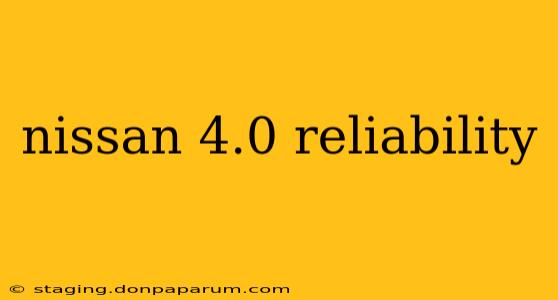The Nissan 4.0L VG40 engine, a robust V6 powerplant, has a history as varied as the vehicles it powered. While generally known for its strength and durability, understanding its reliability requires a nuanced look at its different iterations and applications. This deep dive explores the strengths and weaknesses of the 4.0L VG40, helping you assess its reliability across various models and years.
The VG40 Engine: A Closer Look
The VG40 engine, primarily found in Nissan's larger SUVs and trucks from the late 1980s through the early 2000s, holds a unique place in Nissan's history. This pushrod V6, known for its relatively simple design, offered ample torque, making it well-suited for towing and off-road adventures. However, like any engine, the VG40 had its share of potential issues.
Strengths of the 4.0L VG40
- Torque: The VG40's substantial torque output was a major selling point, making it ideal for heavier vehicles. This impressive pulling power contributed to a positive user experience, especially for those needing towing capacity.
- Simplicity: Its pushrod design, compared to more complex overhead cam (OHC) engines, generally meant fewer potential points of failure. This simplicity translated into potentially lower repair costs in some cases.
- Durability (with proper maintenance): Many VG40 engines have proven remarkably durable when properly maintained. Regular oil changes, using the correct viscosity oil, and addressing any issues promptly are key to maximizing lifespan.
Weaknesses and Potential Problems
Despite its strengths, the VG40 isn't without its potential drawbacks:
- Head Gasket Issues: This is perhaps the most commonly reported problem. Head gasket failure can lead to coolant leaks, overheating, and ultimately, engine damage. Regular inspections and prompt attention to any signs of leakage are crucial.
- Oil Leaks: Several areas, such as valve cover gaskets and rear main seals, are known to be prone to leaks over time. These leaks, while not immediately catastrophic, can lead to oil loss and potentially damage if left unaddressed.
- Intake Manifold Issues: Cracks or leaks in the intake manifold can affect engine performance and fuel efficiency. Regular inspections are recommended to catch these problems early.
- Timing Chain Issues: While generally durable, the timing chain can eventually stretch or break, leading to significant engine damage. Regular maintenance and attentive listening for unusual noises are important.
Reliability Across Different Models and Years
The reliability of the VG40 can vary slightly depending on the specific vehicle and year of manufacture. Factors such as driving conditions, maintenance habits, and even the specific build quality of a particular engine can play a role. Researching specific model years and common issues for your particular vehicle is highly recommended before purchase.
Maintaining Your Nissan 4.0L Engine for Optimal Reliability
Proper maintenance is paramount to extending the life and reliability of your VG40 engine. This includes:
- Regular Oil Changes: Follow the manufacturer's recommended oil change intervals religiously, using the correct type and viscosity of oil.
- Coolant System Maintenance: Regularly check coolant levels and condition. Flush and replace the coolant as recommended.
- Regular Inspections: Visually inspect the engine for leaks, worn components, and other potential problems. Address any issues promptly.
Conclusion
The Nissan 4.0L VG40 engine, while capable of impressive longevity, demands diligent maintenance. Understanding its potential weaknesses and proactively addressing them through regular care can significantly improve its reliability and extend its lifespan. Thorough research, specific to the model year and vehicle in question, is crucial before purchasing a vehicle powered by this engine. Remember, proper maintenance is the key to unlocking the VG40's considerable potential.

